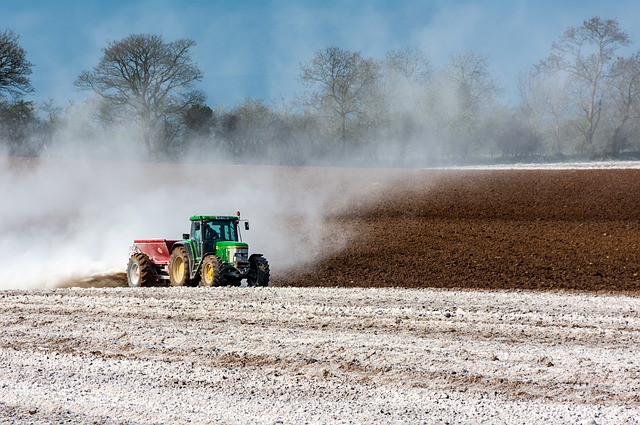A farmer’s lot is not an easy one. A difficult and demanding way of life, farming involves a huge range of challenges and stresses – among them isolation, climate change, and disease outbreaks in crops and livestock.
A recent survey of 15,296 farmers across England and Wales by the Royal Agricultural Benevolent Institution (Rabi) found that 36% of the farming community across England and Wales were probably or possibly depressed.

The pandemic has struck during an uncertain post-Brexit agricultural transition which will see a radical shift in how farmers are paid to manage land and produce food. It has also brought into sharp focus the role of farmers as essential workers.
We began a research project in March 2021 to explore how the pandemic has affected the mental health of farming families in the UK, focusing particularly on the organisations and people who support them.
Pastoral support for farmers is provided by agricultural organisations, mental health charities, agricultural chaplains, and advisers in rural communities. Some of it is focused on mental health and wellbeing, but much of it is not. Rather, it is the support provided by friends and neighbours in rural pubs, auction markets and agricultural shows that improves mental health through mixing socially and fostering a sense of community.

The ‘Landscapes of Support’ project
Though more research is starting to highlight what drives poor mental health in farming, there is little exploration of the support networks providing help to struggling farmers in the UK, or how that support works.
We interviewed 22 people who provide mental health support to farmers in the UK, followed by a survey of 93 support providers and 207 farmers. Our results showed that 67% of farmers surveyed reported feeling more stressed during the pandemic than before it, 63% felt more anxious and 38% felt more depressed.
While a lower, but still worrying, number (12%) felt more suicidal, there is a spectrum of mental ill-health, from initial feelings of stress and anxiety, to clinical depression up to thoughts or acts of suicide. We believe the pandemic is storing up problems that will manifest themselves more seriously later.
We found that the primary reasons for worsening mental health ranged from having less social contact as a result of lockdowns and social distancing, to issues with the public on private land, and social events moving online – which was a particular challenge for families with poor internet connections.
According to those who provide help and support, the five main reasons farmers contacted them during the pandemic were loneliness, family or relationship issues, financial problems, illness, and pressure of regulations and inspections from the government. Barriers to support included the perceived stigma of asking for help, lack of knowledge about available support, the travelling distance involved and lack of time to attend sessions.
Besides the pandemic’s effect on their business, lockdown and social distancing have clearly contributed to worsening mental health in some farming families. But the story for farmers has not been entirely negative.
Participants in our study spoke about feeling more valued knowing they were doing important work keeping people fed. The comfort and support of having family members at home was also reported – although for some this was regarded as stressful. Quieter rural roads during periods of lockdown were also seen as an upside. Some farmers were also encouraged to try communicating online, which improved the skills of those who had good internet connectivity.
Those providing support themselves have struggled to offer the same service during the pandemic. They spoke about the importance of face-to-face interaction and how it is key for effective mental-health support. Farmers have always tended to be more geographically isolated from services such as healthcare, but this was exacerbated during the pandemic.
While supporters adapted by providing advice by phone or video call, this was not accessible to all and not always felt to be as effective. The pandemic also challenged the ability of some local-level farming organisations to raise funds and provide enough staff. For example, Young Farmers clubs – farming community groups that support young people working in the countryside – reported a £1m funding shortfall in 2020.
Our study, alongside Rabi’s Big Farming Survey and other studies showing the value of rural auction markets, makes several recommendations on how to address both the causes of, and support for poor mental health among farmers. Improving support without addressing the underlying reasons for this poor mental health is unlikely to be effective.
What needs to happen
First, given that a huge range of people come into regular contact with farmers – from vets, inspectors and bank managers to other people living in rural communities – basic mental health first-aid training could be provided more widely. This could include improving community knowledge about available support for farmers, which would help to normalise conversations about mental health and encourage people to get help.
Second, more work is needed to understand how to connect the support services used by farming communities. Services such as healthcare, mental health charities and social groups are not always coordinated; it can be difficult for people to know the best way to get support.
Lastly, the benefit of strong links to the community cannot be underestimated when it comes to mental health and wellbeing. The importance of the meeting places that farmers enjoy is key to this community. These are the vital and life-affirming agricultural events and places that COVID denied farmers over the last two years, some of which now face an uncertain future, such as rural pubs. The government needs long-term policies that will help maintain the thriving rural communities that enhance farming life.
David Rose is Elizabeth Creak Associate Professor of Agricultural Innovation and Extension and Faye Shortland is a Postdoctoral Researcher, both in the Department of Applied Economics & Marketing in the School of Agriculture, Policy & Development.
This article is republished from The Conversation under a Creative Commons license.
